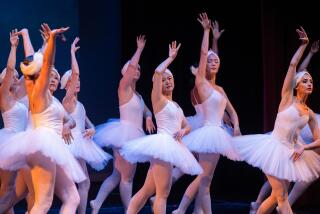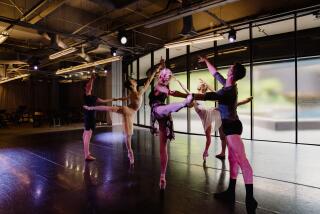Amplifying ‘Don Quixote’
- Share via
The best thing about the Moscow Stanislavsky Ballet “Don Quixote” is the Moscow Stanislavsky Ballet.
Other companies ask their corps and character dancers to stand around while the stars show off. This one sets everyone dancing along with the stars, forming a large-scale amplification of the central action.
It’s thrilling and it’s also the reason why Russian companies remain unbeatable: At the Kodak Theatre on Thursday, you saw a whole community moving from one impulse in one style--impossible in America, where almost everyone is trained by different teachers according to different systems, and increasingly rare in Western Europe.
No matter, then, if the “Don Quixote” sets by M.A. Sokolova prove cluttered and weirdly feverish, the lighting an outright disaster (complete with an unscheduled blackout in the middle of Act 1) and the staging by Alexei Chichinadze hopelessly unfocused. Group energy, group skill, group feeling obliterates every fault.
Even the audience’s mass rush down the aisles at the beginning of the evening--caused by the company’s rehearsing as long as possible and refusing to open the house until 7:58--suits the ensemble dynamics of the occasion.
Although the company credits its choreography to Alexander Gorsky, who created a celebrated “Don Quixote” in 1900, most of the dances are the same as those found in productions credited to Marius Petipa. As always, music by “L. Minkus” (Ludwig or Leon depending on which source you consult) propels the story of young lovers evading a boorish father (Dmitry Erlikin) and an effete nobleman (Anton Domashev).
Don Quixote and Sancho Panza (Alexander Kopchinsky and Denis Perkovsky) remain vague adjuncts to this love story, though Sancho, in particular, gets several major character dances of impressive buoyancy in this version.
Also showing up for no evident reason is the matador Espada (Andrey Shishkin), owner of the sheerest, tightest tights in all of Spain, and his girlfriends: Mercedes (Olga Kriazheva), who dances whenever anyone puts a line of tankards on the floor, and a nameless tavern wench (Kadria Amirova) who throws backbends at Espada with lascivious intent.
Other stagings try to make subsidiary characters integral to a neat, logical plot, but Chichinadze just lets them come and go as components in a social panorama. The result may be a mess as dance drama, but it sends the dancers a message: You are here to make an effect--only that. Go for it.
And they do, with Perkovsky, Shishkin and Domashev especially spirited but absolutely everyone sustaining a party atmosphere through nearly three hours. The 32 grandees in black and white who ornament the final scene may be the ultimate statement of group solidarity, but there are always dancers on the sidelines who deserve a spotlight.
Of course, every “Don Quixote” belongs to the spitfire Kitri and her beloved, penniless Basil. In Natalia Ledovskaya, the company boasts a Kitri with a fabulous jump, spectacular balances, fiery attacks, delicate pointe-work and faultless precision, plus the ability to remain a good sport when Georgy Smilevsky’s precarious one-armed lifts leave her teetering on the brink of catastrophe.
Smilevsky’s dancing has charm and impact, though the role’s technical fireworks sometimes overtax him and the partnering often looks downright chancy. More reliable classicism comes from Natalia Schelokova and, especially, Anastasia Pershenkova in the two Act 3 variations, Ioulia Sabirzianova as a pert, weightless Cupid and Natalia Krapivina as a majestic if unnecessarily grave Queen of the Dryads.
Krapivina and Smilevsky had introduced local audiences to Moscow Stanislavsky excellence on Tuesday in the first duet of artistic director Dmitry Bryantsev’s “The Spirit Ball,” and all the dancing swans and Spaniards since then haven’t lessened the feeling that we should give this company the chance to define itself through new work--the kind of ballets that made and sustains its reputation--rather than playing to our 19th century expectations.
*
“Don Quixote,” Moscow Stanislavsky Ballet, today, 2 and 8 p.m.; “Swan Lake,” Sunday, 2 p.m. Kodak Theatre, 6801 Hollywood Blvd., Hollywood. $32-$72. (213) 365-3500.
More to Read
The biggest entertainment stories
Get our big stories about Hollywood, film, television, music, arts, culture and more right in your inbox as soon as they publish.
You may occasionally receive promotional content from the Los Angeles Times.










